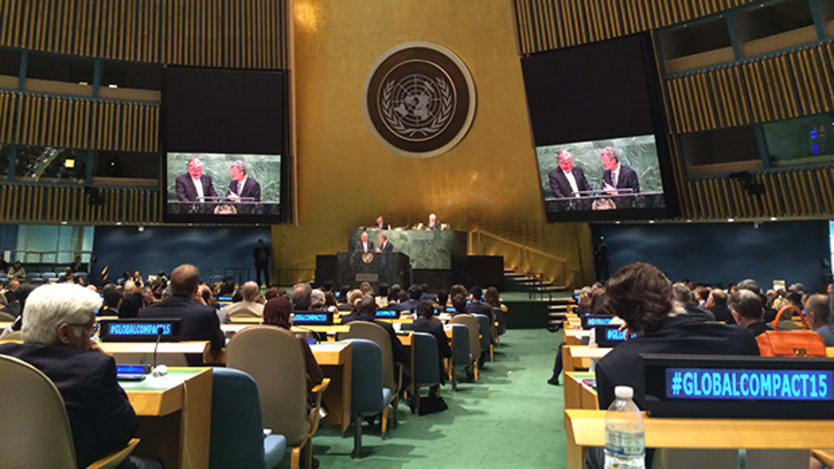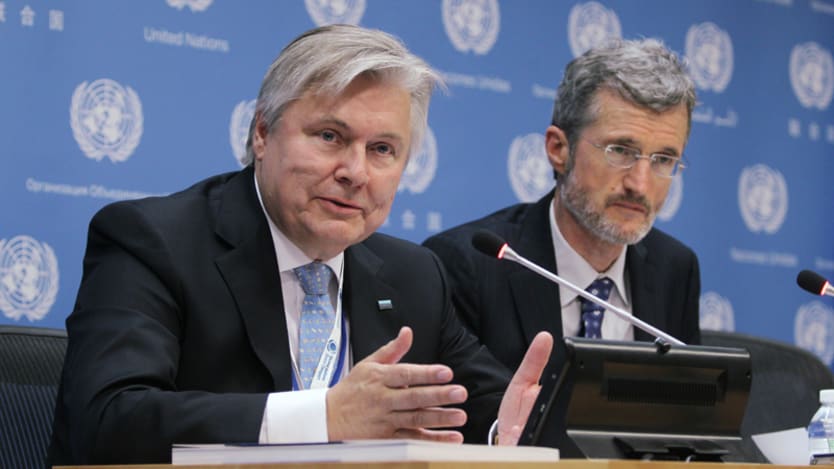
It began with a proposal.
In 1999, then-U.N. Secretary-General Kofi Annan addressed the World Economic Forum in Davos, Switzerland, in a speech that served as a call to action for the business community.
“I propose that you, the business leaders gathered in Davos, and we, the United Nations, initiate a global compact of shared values and principles, which will give a human face to the global market,” he said.
It could have ended there, but what transpired was a series of informal discussions, followed by the formal launch of the U.N. Global Compact in 2000. It included 44 global companies, two labor organizations, 12 civil society members and six business associations. The first meeting, on June 26, 2000 — when business leaders met at the U.N., sitting in seats most often occupied by country representatives — caused quite a stir.
Civil society representatives — and even some governments — were skeptical about the new initiative; perhaps even more so about the inclusion of business at the U.N.
Former Irish President Mary Robinson, who served as the U.N. High Commissioner for Human Rights and in attendance at the initial speech to launch the Global Compact, was forthright. This was a “radical initiative” to engage a wider group of players in the U.N. and quite a departure from the past, she said at the time.
And it was not to be without its challenges. Indeed, the Global Compact needed to build trust, because the relationship between business and human rights was conflicted — especially on a local level, where human rights violations were often committed by or on behalf of corporations, she said.
While some of those concerns would linger for some time, the evolution of the agency and of the role of business in development has undeniably been dramatic.
“What began as a simple call to action has become a global force for good,” said U.N. Secretary-General Ban Ki-moon last week at an event marking the Global Compact’s 15th anniversary. While some said that the U.N. had “bitten off more than it could chew” in trying to mobilize the international business community to embrace a set of universal principles, today the Compact has more than 8,000 participants who have committed to doing business responsibly, he said.
Building an agency
After the gusto of that first meeting, the hard work began in earnest for Georg Kell, executive director of U.N. Global Compact, who is stepping down later this year.
“Then the real nightmare started,” Kell said in a recent interview. He was faced with building the nascent organization with no money and no staff.
The first phase was all about learning how to interpret and define the Compact’s 10 principles, which cover responsible business practices on human rights, labor, the environment and anti-corruption efforts.
The team grew around Kell and moved into a second phase — building a mandatory annual disclosure framework and a new organizational model. The Global Compact launched a decentralized governance framework and with it the first local network. Today there are 88 local networks around the world, though some clearly work better than others. Indeed, the local networks model and the performance of particular networks has faced stern criticism from some quarters.
The next phase, from 2007 to 2010, brought with it increasing scale and the launch of several issue platforms, including Principles for Responsible Investment, Business for Peace, the Women’s Economic Principles, the CEO Water Mandate and Caring for Climate.
Its areas of progress — human rights, anti-corruption efforts and social inclusion — weren’t mainstream business concerns in 2000, Kell said, but admitted that there is much work left to do.
“The glass, at best, is half full,” he said.
The Global Compact’s 8,000 business participants still represent a relatively small part of the business population — there are about 50,000 publicly listed companies across the globe — and of those who participate, maybe only 10 percent are cutting edge, with the additional 90 percent at different levels, Kell said.
“We’ve not yet reached the critical tipping point,” he said. “The majority of companies are still sitting on the fence pretending these issues don’t matter for them, because others have to take care of it, or worse they’re into just short-termism: quarterly, nanosecond returns.”
Along the way, the Global Compact has helped change the discourse within business and at the U.N.
“It has contributed massively to open the U.N.,” said Marcos Neto, manager of private sector and foundations at the U.N. Development Program. “[The private sector] is still not an easy topic in the U.N., it is still the enemy to a lot of people, but there is no doubt it is much better.”
The redefinition of the relationship has made a difference for some companies as well.
“The Global Compact has helped us to align and to frame the way in which the private sector, and companies like Nestlé, can engage in collective action,” said Paul Bulcke, Nestlé’s CEO, at last week’s anniversary event.
But for others, like global biotech company Novozymes — a member from the start — it has been less about learning and more about spreading the message.
“It has helped us draw the interest and acceptance of sustainability in the world,” said Claus Pedersen, Novozyme’s head of corporate sustainability.

Growing pains
The U.N. Global Compact met early resistance and criticism has continued — some arising from skepticism of the private sector’s role in development, but also from the nature of the nonbinding principles.
“Of course there were teething problems,” said Robinson, who has also served as a Global Compact board member and chair of its committee on human rights. She described herself as an “older sister” to Kell, who would urge him to improve the agencies accountability and not allow corporations to have a “blue rinse.”
Despite progress, some of those early challenges remain. Robinson last week questioned how many Global Compact member companies are today fully compliant with human rights standards, particularly those laid out in the U.N. Guiding Principles on Business and Human Rights.
Issues of compliance were front and center in a 2010 U.N. Joint Inspection Unit report that found that the Global Compact lacked proper regulatory governmental and institutional frameworks, lacked effective screening and monitoring of members, questioned the organization’s governance and funding structure, and called for regular independent performance evaluations.
“Ten years after its creation, despite the intense activity carried out by the Global Compact Office and the increasing resources received, results are mixed and risks unmitigated,” the report stated.
The inspectors also called for the U.N. General Assembly and the secretary-general to provide more guidance to prevent a situation where a company or other nonstate actor would divert attention from development goals or damage the reputation of the U.N.
The Global Compact only requires participants to submit annual reports to retain membership, even if they do not fully abide by the 10 principles. It is a much less stringent requirement than that of other U.N. organizations, which in their due diligence processes have had to reject some Global Compact participating companies for failing to meet their requirements.
Some of the issues arise from the very nature of the Global Compact. After all, it is a voluntary, nonbinding agreement. Its main recourse is to delist or revoke membership for companies that fail to submit reports, something it has done thousands of times.
“The genesis of the compact meant that it had to be generic, it couldn’t be specific, it couldn’t be too demanding because we were at the beginning of this conversation,” said Neto. “We couldn’t have scared business away by coming in heavy handed ... It was very well-structured in the beginning, but has been very timid in evolving in the last 15 years.”
What’s next?
Today the Global Compact finds itself at a crossroads. Fifteen years on, with a new set of global development goals set to be ratified in September and a new leader waiting in the wings, it can continue on its current trajectory or take steps to redefine what its role will be moving forward.
One of the compact’s goals is to have 20,000 participating companies by 2020 — a number Kell said would signify critical mass that can lead to catalytic change.
But some are skeptical that a tipping point that comes from numbers alone may be purely symbolic. Robinson and Neto both questioned how many Global Compact participants are abiding by the principles and raising the issue of how to measure success.
These new decisions will be directed by a new leader. When Kell steps down at the end of August, Lise Kingo will take up the reins. Kingo, who was announced as the next executive director last week, was most recently the chief of staff and an executive vice president at Novo Nordisk.
She will surely be greeted with a flurry of ideas about what the Global Compact should do — or become — in the next 15 years.
Some are calling for this new era to be marked by better reporting, in part through stricter criteria for membership and expulsion. Others are looking to the Global Compact to continue to play a role in expanding and improving private sector engagement at the U.N.
What it needs to do is do a better job of translating high-level principles into action, said Ruben Vellenga, a private sector partnership specialist at the U.N. Population Fund.
The Global Compact can help harmonize the due diligence approaches and provide guidance or a set of standards for how to partner and how to communicate, he said.
According to Novozymes’ Pedersen, it can also continue to help build trust between business and governments where there is still skepticism about the motivations of business. But more than that, he believes it’s time for the Compact to fundamentally change the nature of what it does.
“A key challenge for the Global Compact is to get out of the standards reporting mode … and get into how we help business succeed,” he said. “How we take this from something you do to be responsible … and move it into the core business.”
If these issues remain about corporate responsibility, there will be a small elite of companies participating. However, only if it is about sustainability and business growth can it truly succeed, Pedersen said.
That is not a challenge for the Global Compact alone, but part of the broader debate raging in the business community today about moving away from traditional CSR and toward sustainability, shared value and inclusive business practices.
One of those challenges is “short-termism.”
“For me breaking that bottleneck is perhaps the single-biggest issue to allow business leaders the flexibility, the creativity to plan sustainable development and to converge core business to the sustainable development goals,” Neto said, adding that the Compact needs to help lead that movement.
Drivers of change
According to Kell, the biggest drivers of change on these issues will be regulations, finance, citizens or consumers and educators. The Global Compact, through the Principles for Responsible Investment and the Principles for Responsible Management Education, already has systems in place to work with finance and educational institutions.
How those platforms translate papers and guidelines into concrete action will be interesting to observe. Indeed, a lot relies on the business community and on strong leadership — not only from corporations, but from citizens demanding change.
“We are doing what we can, but we are not yet doing what we must,” said Paul Polman, the CEO of Unilever, at the event.
“This could be the year when the world sets the pathway for a different kind of future,” he said, adding that it cannot all be left to politicians. “Business can’t stay on the sidelines of the system that gives them life.”
The change in the past 15 years in the role of business at the U.N. — and in global development writ large — is undoubtable, and many agree it would not have happened in this way were it not for the Global Compact. While not without its controversies and stumbling blocks, it has engaged the business community with development in a whole host of new ways.
The Global Compact has weathered its early steps but as it continues through its adolescence it will be interesting to see what role it decides to play in the future. One thing’s for sure: If the last 15 years are any indication, it should be interesting to watch.
Join Devex to network with peers, discover talent and forge new partnerships in international development — it’s free. Then sign up for the Devex Impact newsletter to receive cutting-edge news and analysis at the intersection of business and development.








